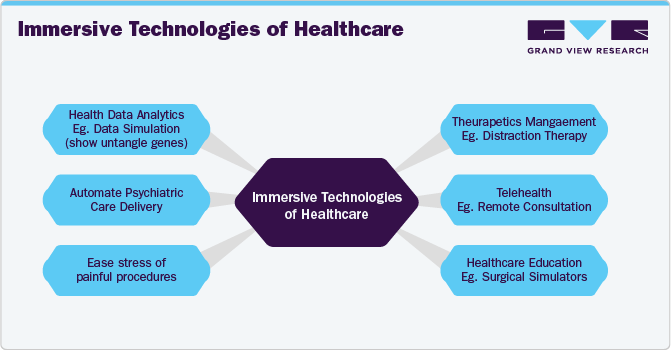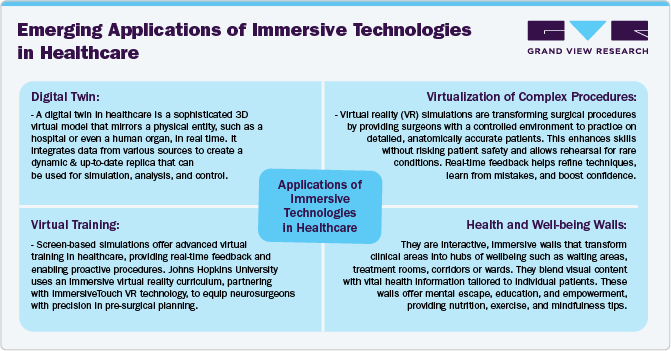- Home
- »
- Healthcare IT
- »
-
Immersive Technology in Healthcare Market Size Report 2030GVR Report cover
![Immersive Technology in Healthcare Market Size, Share & Trends Report]()
Immersive Technology in Healthcare Market Size, Share & Trends Analysis Report By Region, And Segment Forecasts, 2024 To 2030
- Report ID: GVR457977
- Number of Report Pages: 0
- Format: PDF, Horizon Databook
- Historical Range: 2018 - 2023
- Forecast Period: 2024 - 2030
- Industry: Healthcare
The market for immersive technologies in healthcare is predominantly fueled by the need for enhanced patient engagement, essential for delivering high-quality, patient-centered care. Technologies, such as Mixed Reality (MR), Augmented Reality (AR), and Virtual Reality (VR), have emerged as powerful tools to facilitate this engagement, transforming how patients interact with medical information and healthcare providers. Traditional patient education methods, like pamphlets and verbal explanations, often fall short of capturing patients' interest and ensuring comprehension of complex medical concepts. Immersive technologies foster deeper interaction and understanding, thereby enhancing the learning experience.
Furthermore, these technologies improve the informed consent process by allowing patients to explore treatment environments virtually, leading to better comprehension, increased transparency, and stronger trust between patients and healthcare professionals. This heightened engagement promotes better adherence to treatment plans, as patients who actively participate in their care are more likely to follow medication regimens, make necessary lifestyle changes, and attend follow-up appointments. For instance, In April 2024, the FDA announced the launch of Home as a Health Care Hub initiative to improve health equity in home healthcare. The initiative will involve patient groups, care providers, and the medical device industry. It will focus on a home's structural and critical elements to create an adequate healthcare environment. The hub will be designed as an AR/VR-enabled home prototype that aims to reimagine the home environment as an integral part of the healthcare system.
Various initiatives, startups, and government actions shape immersive technologies in healthcare. Increased public and private sector investment in healthcare innovation drives the adoption and development of immersive technologies. For instance, in February 2024, Innovate UK and HIN South London partnered to support UK innovators in developing immersive digital mental health solutions. The Mindset program, worth USD 20 million, aims to accelerate treatment by leveraging digital therapies for mental health concerns. The XR Innovator Support Programme will provide expert guidance for funding opportunities, specialized support for large-scale industrial research, and a knowledge-sharing community. The collaboration combines expertise in service user engagement, digital therapeutics, regulation, and clinical research design, enabling UK-wide reach and tackling challenges in integrating immersive technology into healthcare and society.
“Fostering collaboration between the immersive technology sector and mental health providers is pivotal to driving innovation to address critical challenges in mental health care. This program, with its commitment to empowering innovators and providing robust support, will drive business growth by inspiring and unlocking innovations that make life better.”
-Dr. Stella Peace, Executive Director for the Healthy Living and Agriculture Domain at Innovate UK.

Immersive Technologies in Pain Management: In pain management, immersive technologies offer a compelling alternative to traditional pain medications through methods like immersive distraction therapy. Moreover, VR has the potential to immerse patients in virtual settings, effectively diminishing their perceived pain levels. This technique has demonstrated efficacy in pediatric care. It assists young patients facing challenging procedures by providing distraction through VR experiences. The strategy decreases anxiety and increases patient cooperation throughout treatment, enhancing adherence to post-operative guidelines. For instance, in March 2024, Irish technology company vStream launched a campaign to sign 10,000 patients for ShineVR, a VR Cognitive Behavioural Therapy (CBT) platform designed for stress reduction, well-being, and chronic pain. The platform offers data-driven, personalized experiences in immersive spaces with evidence-based activities, guiding patients through guided paths to achieve desired outcomes.
Immersive Technologies in Healthcare Education: Immersive technologies are revolutionizing the training of medical practitioners and students by providing interactive, real-life simulations. These technologies significantly reduce learning time and enhance the understanding of operative techniques through realistic visualizations. Immersive technologies like AR/VR train non-radiologists in bedside ultrasounds, demonstrating their rapid and efficient learning potential. This approach allows healthcare providers to meet the growing demand for trained practitioners in a shorter timeframe, enhancing performance and knowledge application.
For instance, in April 2024, Osso VR launched Osso Health, a medical training app on Apple Vision Pro, which combines digital content with the physical world to provide detailed, clinically accurate workflows of common procedures. This app facilitates procedural education, making it accessible to patients preparing for surgery, healthcare professionals, and those interested in medical innovation. Featuring a three-dimensional user interface and an input system controlled by hands, eyes, and voice, it allows users to explore medical procedures intuitively. The high level of medical artistry by Osso VR enhances the authenticity of the training, making it a useful tool for medical students, practicing physicians, and professional doctors.

Regional Insights
North America is the largest market for immersive healthcare technologies, driven by advanced healthcare infrastructure, high adoption rates of innovative technologies, and substantial investment in R&D. The presence of major technology companies, significant funding for healthcare innovation, and a high incidence of chronic diseases requiring advanced treatment options fuel the market growth. For instance, in November 2023, Jolly Good Inc., a medical VR company, established a North American subsidiary to expand its regional business. The company focuses on spatial computing development, including "Apple Vision Pro," in its medical education VR and digital therapy VR businesses. In the first development phase, Jolly Goodwill developed a cognitive behavioral therapy program for chronic pain that aims to help patients cope with opioid abuse and addiction, and Jolly Good plans to expand its business to other psychiatric disorders.
Competitive Landscape
Some notable players in immersive technology in the healthcare market include Samsung Group, Sony Corporation, Unity Software Inc., Source: Acer Inc., Atheer, Inc., AVEVA Group PLC, and more. These players undertake several strategies, such as partnerships & collaborations, product launches, and geographical expansion, to strengthen their market presence. For instance, in February 2024, the Leeds XR Health Hub, a partnership between the University of Leeds and Leeds Teaching Hospitals Trust, is funded by Leeds Hospitals Charity. It aims to enhance staff's technical expertise in creating immersive training solutions for clinical frontlines by offering training, equipment, bespoke application development, device support, and hackathons.
Recent Developments
-
In February 2024, Sharp HealthCare, a San Diego-based healthcare group, launched a Spatial Computing Center of Excellence. The center is expected to focus on using the Apple Vision Pro AR headset to improve patient care. The center will collaborate with information analytics firm Elsevier and EHR vendor Epic to explore spatial computing's potential to enhance effectiveness and productivity in various clinical roles
-
In February 2024, Visage Imaging, Inc., a subsidiary of Pro Medicus Ltd., launched Visage Ease VP for Apple Vision Pro, a spatial computing platform. The new device offers immersive experiences for diagnostic imaging and multimedia, incorporating Visage's cinematic rendering engine for volume-rendered images. It offers on-the-go access with virtual screens at over 4K resolution per eye, independence from environmental lighting restrictions, and seamless interaction with imaging in physical space
Share this report with your colleague or friend.
![gvr icn]()
NEED A CUSTOM REPORT?
We can customize every report - free of charge - including purchasing stand-alone sections or country-level reports, as well as offer affordable discounts for start-ups & universities. Contact us now
![Certified Icon]()
We are GDPR and CCPA compliant! Your transaction & personal information is safe and secure. For more details, please read our privacy policy.
We are committed towards customer satisfaction, and quality service.
"The quality of research they have done for us has been excellent."





